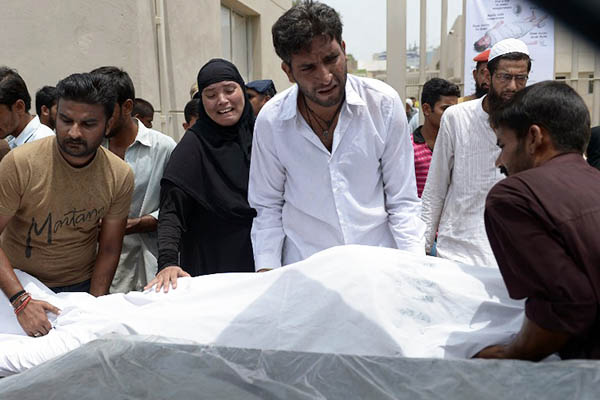
Rizwan Tabassum—AFP
Lower temperatures in Karachi yet to impact already suffering heatstroke victims.
The death toll from Pakistan’s killer heatwave neared 1,200 on Thursday, as cloud cover and lower temperatures brought some relief to the worst hit city Karachi.
Morgues and gravediggers in Karachi, Pakistan’s largest city and economic hub, have struggled to keep up with the flow of bodies since the scorching temperatures began last weekend. Hospitals have been on a crisis footing and dedicated heatstroke treatment centers have been set up around the city to treat the thousands affected by heatstroke and dehydration.
“The death toll is nearing 1,200 according to the data collected,” said provincial health secretary Saeed Mangnejo, warning that more deaths were expected. “Thirty others also died in Thatta district due to same heatwave,” he added.
On Wednesday, Sindh Health Minister Jam Mehtab said the death toll was expected to rise as there were hundreds of people in critical condition in hospitals across Karachi. “We have reports from other cities as well. There have been deaths in Thatta, and Hyderabad.” He said over 400 bodies had been received at Jinnah Hospital, 84 at Abbasi Shaheed Hospital, 83 at Civil Hospital, 29 at Qatar Hospital, 35 at General Hospital, 22 at Lyari General Hospital, and over 100 at other private hospitals.
After days of temperatures hovering at highs in the mid-40s Celsius, sea breezes and cloud cover have brought respite to the port city in the last two days. The Met Office forecast temperatures of around 34 degrees Celsius on Thursday, with 75 percent cloud cover.
Pakistan’s largest charity, Edhi Foundation, said their mortuaries in the city had received such an influx of bodies that they were struggling to keep them properly chilled.
Victims’ families have also faced challenges in burying their dead, as gravediggers have struggled to keep up with demand in the scorching heat. Local charities have stepped up in some cases to aid the impoverished by providing them free land for burials. Taskeen Shah, whose father died of heatstroke, said he had been unable to find any gravesite he could afford. “A charity organization offered to help us. My father never got much peace in life, but at least he’ll be able to rest after death,” he said, tearfully.
While temperatures of 45C and higher are not uncommon in parts of inland Pakistan, Karachi normally remains cooler thanks to its coastal location.
This year’s heatwave has also coincided with the start of the Islamic fasting month of Ramzan, during which millions of devout Pakistanis abstain from food and drink from sunrise to sunset. Under Pakistani law, it is illegal for Muslims to eat or drink in public during daylight hours in Ramzan.
The majority of the deaths in Karachi have been among the poor and manual laborers who toil outdoors, prompting clerics to urge those at risk of heatstroke not to fast. The situation has not been helped by power cuts—a regular feature of life in Pakistan—which have stopped fans and air conditioners from working and interrupted Karachi’s water supply.
